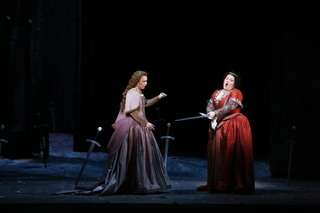|
Back
Women Rule in Spain Houston
Brown Theater, Wortham Theater Center
04/26/2013 - & April 28, May 1*, 4, 8, 11, 2013
Giuseppe Verdi: Il trovatore
Peixin Chen (Ferrando), Natalya Romaniw (Ines), Tamara Wilson (Leonora), Tómas Tómasson (Count di Luna), Marco Berti (Manrico), Dolora Zajick (Azucena), Nicholas Masters (An Old Gypsy), Kevin Ray (Messenger), Scott Quinn (Ruiz)
Houston Grand Opera Orchestra and Chorus, Patrick Summers (conductor), Stephen Lawless (Director)
Benoît Dugardyn (Set Designer), Martin Pakledinaz (Costume Designer), Michael James Clark (Lighting Designer)

N. Romaniw and T. Wilson (© Felix Sanchez)
Verdi's Il trovatore requires the perfect quartet of leads to fulfill its melodic riches. Houston Grand Opera's current production, a slick, opulent counterpart to the concurrently running Tristan und Isolde, reaches for great heights. In the casting of the two female leads, it is a great success. But their male foils simply aren't quite as strong and, in that way, the suffers from the same flaw that Tristan does.
Dolora Zajick, a living legend as Azucena, delivered the haunting power and vocal prowess that one would expect. Her first line ("Stride la vampa!") summed up both her signing and the wonderful staging the opera is given. Director Stephen Lawless smartly played up the fire in the music in a richly detailed, cleverly constructed set design. The costumes feature Hollywood-ready armor and luxurious gowns alongside more tawdry choices when appropriate. In all, the stage is perfectly set to allow us to be swept into the tumultuous current of action. The ubiquity of swords on stage was a perhaps heavy-handed reminder of the ever presence of violence in the plot, but they were always interestingly arranged to frame the action.
Zajick is the strongest voice in the cast. Her experience in the role and robust voice are thrilling, especially in her rich low register, where she easily projects over the orchestra and her gypsy choristers. Her interpretation of the role is strong through and through, although there was a glimpse of vulnerability in her character in the final scene, an aspect that found her softening her voice as much as possible. Tamara Wilson's Leonora was smartly sung. Her voice at first seemed too light for the role, but it quickly becacme clear that she is capable of many gradations of power, and in the end, hers was the most satisfying overall performance. She graced the audience with a stunning "D'amor sull'ali rosee," eliciting audible, involuntary "oohs" and "aahs" of approval from many (myself included). It was easily the vocal highlight of the evening.
The male leads sing with more mixed results. Manrico was given a mostly shrill and strained run through by Marco Berti, perhaps having an off night. He did come alive for his big moment, delivering a thrilling "Di quella pira," but otherwise his performance was something of a letdown. Tómas Tómasson clearly has the power, accuracy and range for di Luna, but the tone was not always attractive. In many cases, this added to the villainous nature of his character, but at times, one wished for a more delicate approach. Peixin Chen, a current member of the venerable HGO Studio, was extraordinary as Ferrando. His opening scene makes one eager to follow his development.
Patrick Summers led his crackerjack HGO orchestra splendidly. There was thrilling brass playing throughout, always a hallmark of this group in Verdi. The HGO Chorus, especially the men, were wonderfully agile and powerful in their substantial moments throughout the opera. In sum, this is a great looking but unevenly sung close to HGO's 2012-13 season.
Marcus Karl Maroney
|